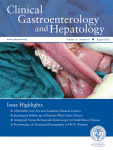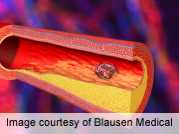CGH:阿司匹林能够阻止巴瑞特食道炎产生
2012-07-27 ZinFingerNase 生物谷
根据一项发表在2012年7月那期Clinical Gastroenterology and Hepatology期刊上的新研究,服用阿司匹林似乎能够降低患上巴瑞特食道炎(Barrett's esophagus, BE)的风险,其中巴瑞特食道炎已知是食道癌的最大风险因子。 美国麻省总医院技术评估研究所的Chin Hur博士和他的研究团队分析了影响34名巴瑞特食道炎患者的因素的特征,以便可能将这些因
根据一项发表在2012年7月那期Clinical Gastroenterology and Hepatology期刊上的新研究,服用阿司匹林似乎能够降低患上巴瑞特食道炎(Barrett's esophagus, BE)的风险,其中巴瑞特食道炎已知是食道癌的最大风险因子。
美国麻省总医院技术评估研究所的Chin Hur博士和他的研究团队分析了影响34名巴瑞特食道炎患者的因素的特征,以便可能将这些因素用于筛选和管理。除了发现服用阿司匹林的病人患上巴瑞特食道炎的几率下降了44%,研究人员还发现男性患上巴瑞特食道炎的几率是女性的3倍。
在过去几十年,食道癌发生率一直以惊人的速度在不断增加。当前试图对这种类型癌症开展的定向筛查重点关注在鉴定巴瑞特食道炎是否存在。服用非类固醇类抗炎药(nonsteroidal anti-inflammatory drug, NSAID),特别是阿司匹林一直与下降的食道癌发生率相关联。尽管已有很多研究分析利用NSAID和阿司匹林对食道癌或由巴瑞特食道炎发展为这种癌症的过程进行化学预防,但是很少有研究研究利用NSAID来预防巴瑞特食道炎产生。
本文编译自Aspirin protects against Barrett's esophagus

doi: 10.1016/j.cgh.2012.02.031
PMC:
PMID:
Aspirin Protects Against Barrett's Esophagus in a Multivariate Logistic Regression Analysis
Zehra B. Omer, Ashwin N. Ananthakrishnan, Kevin J. Nattinger, Elisabeth B. Cole, Jesse J. Lin, Chung Yin Kong, Chin Hur
Background & Aims Better criteria are needed to identify patients who should be screened for Barrett's esophagus (BE) to reduce overtesting and improve the cost effectiveness. There is evidence that chemopreventive agents such as nonsteroidal anti-inflammatory drugs, particularly aspirin, reduce the risk of esophageal adenocarcinoma (EAC), but little is known about their effects on BE. We analyzed characteristics of patients with BE for factors that might be used in screening and management. Methods In this case-controlled study, we identified 434 patients with BE diagnosed at the first endoscopy (incident cases) at a single institution (1997–2010). BE cases were matched with controls on the basis of indication for endoscopy, year of endoscopy, and endoscopist. Risk factors analyzed included age, sex, body mass index, medical and social history, and medications. We performed a multivariate logistic regression analysis to identify clinical risk factors for BE. Results In a multivariate regression model, men had a greater risk for developing BE (odds ratio, 3.2; 95% confidence interval, 2.3–4.4), whereas current aspirin users had a lower risk than nonusers (odds ratio, 0.56; 95% confidence interval, 0.39–0.80). A subset analysis, limited to patients who had endoscopies for symptoms of gastroesophageal reflux disease, yielded similar findings. No interactions were found between aspirin use and smoking or use of acid-suppressive medications. Conclusions In a case-controlled study of 434 patients with BE, current aspirin use appeared to reduce the risk of BE; previous studies associated aspirin use with a reduced risk of EAC. Although efforts were made to minimize biases in our analysis, the possibility of residual confounding remains.
本网站所有内容来源注明为“梅斯医学”或“MedSci原创”的文字、图片和音视频资料,版权均属于梅斯医学所有。非经授权,任何媒体、网站或个人不得转载,授权转载时须注明来源为“梅斯医学”。其它来源的文章系转载文章,或“梅斯号”自媒体发布的文章,仅系出于传递更多信息之目的,本站仅负责审核内容合规,其内容不代表本站立场,本站不负责内容的准确性和版权。如果存在侵权、或不希望被转载的媒体或个人可与我们联系,我们将立即进行删除处理。
在此留言










#CGH#
59